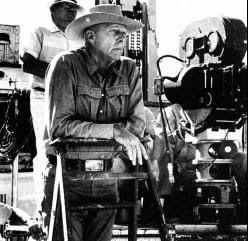 Filmmaker Howard Hawks (1896 - 1977) was one of the lions of Hollywood's Golden Age. A tall laconic Midwesterner, his career spanned six decades. Hawks defined a good film as one that had "three good scenes and no bad ones." Hawks was a man's man and his films reflected it. A pilot and sportsman, he was hunting and drinking buddies with William Faulkner and Ernest Hemingway. The typical Hawksian hero was a professional who did his job well, and did it without complaining, even when the odds were stacked against him. Such was Sheriff John T. Chance (played magnificently by John Wayne) in what turned out to be something of a comeback for Hawks and arguably his last successful film Rio Bravo (1959). Actually, Wayne is overshadowed somewhat by a most atypical co-star -- Dino Crocetti. You might know him better as Dean Martin. Rounding out the cast were Ricky Nelson, Walter Brennan, Ward Bond, and a 19 year old newcomer Angie Dickinson.
Filmmaker Howard Hawks (1896 - 1977) was one of the lions of Hollywood's Golden Age. A tall laconic Midwesterner, his career spanned six decades. Hawks defined a good film as one that had "three good scenes and no bad ones." Hawks was a man's man and his films reflected it. A pilot and sportsman, he was hunting and drinking buddies with William Faulkner and Ernest Hemingway. The typical Hawksian hero was a professional who did his job well, and did it without complaining, even when the odds were stacked against him. Such was Sheriff John T. Chance (played magnificently by John Wayne) in what turned out to be something of a comeback for Hawks and arguably his last successful film Rio Bravo (1959). Actually, Wayne is overshadowed somewhat by a most atypical co-star -- Dino Crocetti. You might know him better as Dean Martin. Rounding out the cast were Ricky Nelson, Walter Brennan, Ward Bond, and a 19 year old newcomer Angie Dickinson.Rio Bravo is a reactionary film. Let me explain. Howard Hawks had moved to France after the critical and commercial failure of Land of the Pharaohs -- a 1955 Warner Bros. costume epic about the building of the Great Pyramid. On his return to America he was dismayed by the growing popularity of television versus movies, and TV's penchant for sacrificing characterization in order to keep the plot moving forward. Also, according to film critic and Hawks friend Richard Schickel, he disliked the popular 1957 Western 3:10 to Yuma (remade in 2007) because of it's portrayal of amateurs doing the work of professional lawmen. He hadn't cared much for High Noon, several years earlier, for similar reasons. In many respects Rio Bravo is Hawks' answer to the TV Westerns, and a restatement of his code of ethics and ideas about manhood and professionalism. In one scene Chance pointedly turns down an offer of help from a good citizen because "you're not good enough."
Rio has it's quota of tense standoffs and flying lead, but at 140+ minutes it gives us plenty of time to simply enjoy the company of Chance, Dude, Colorado, Stumpy and Feathers. It's a generic Western, elevated to high art by the natural dialogue, acting and directorial genius of Hawks. Russian composer Dimitri Tiomkin (more on him next Friday) and crack writers Jules Furthman and Leigh Brackett deserve much credit as well. Brackett, oddly enough, went on to co-write The Empire Strikes Back. A critic of the time called it an "agreeable" movie. I think I know what that critic was getting at. It's agreeable like an evening reading a book in a well-worn easy chair is agreeable.
After 50 years, Rio Bravo continues to find an admiring audience. Quentin Tarantino, poster boy of postmodern cinematic excess, counts it as one of his favorite films. Say what you want about Quentin, he's a perceptive critic and reverent admirer of great directors of the past. Here he is talking about Hawks and Rio Bravo at the 2007 Cannes Film Festival.
No comments:
Post a Comment